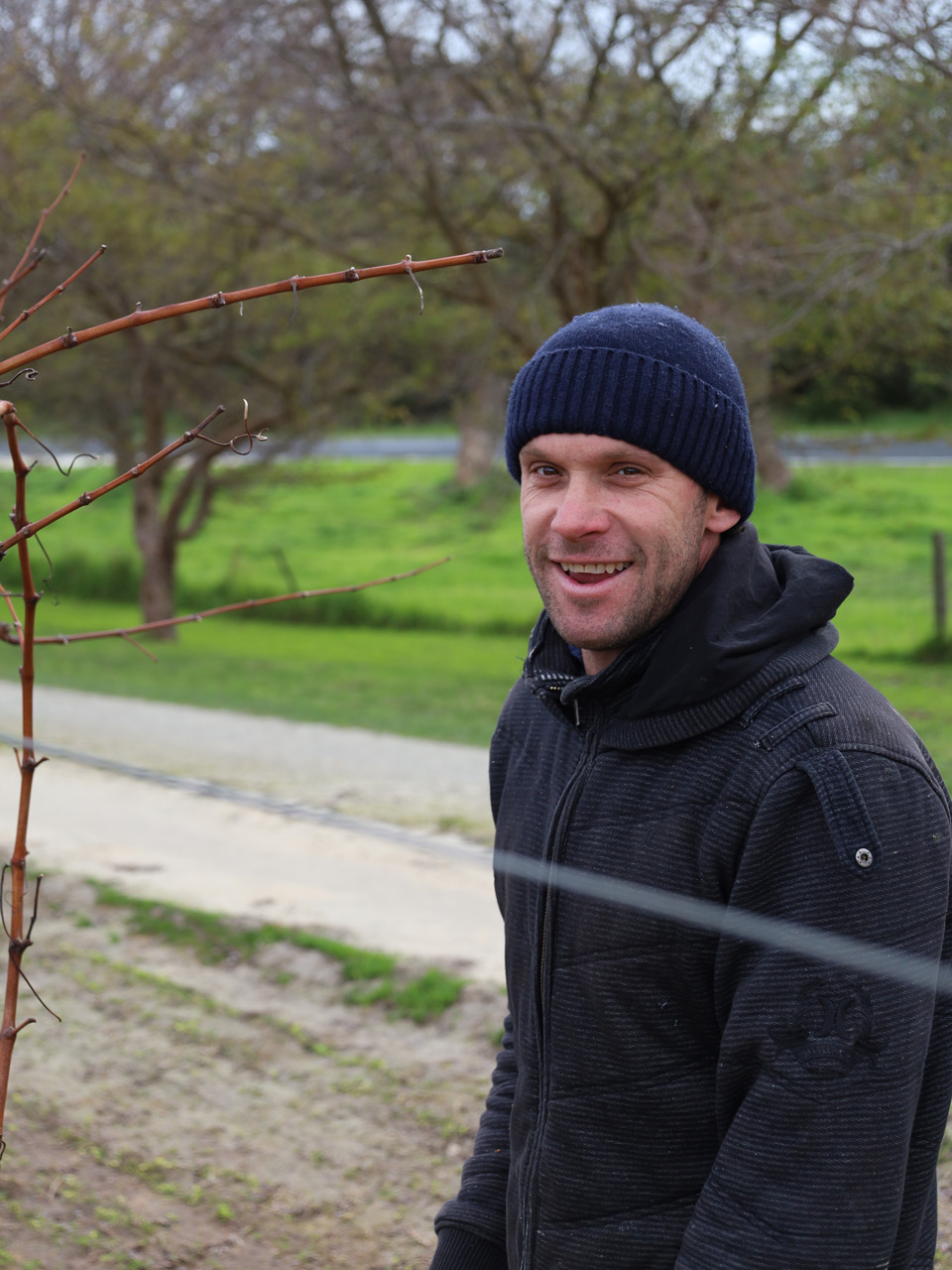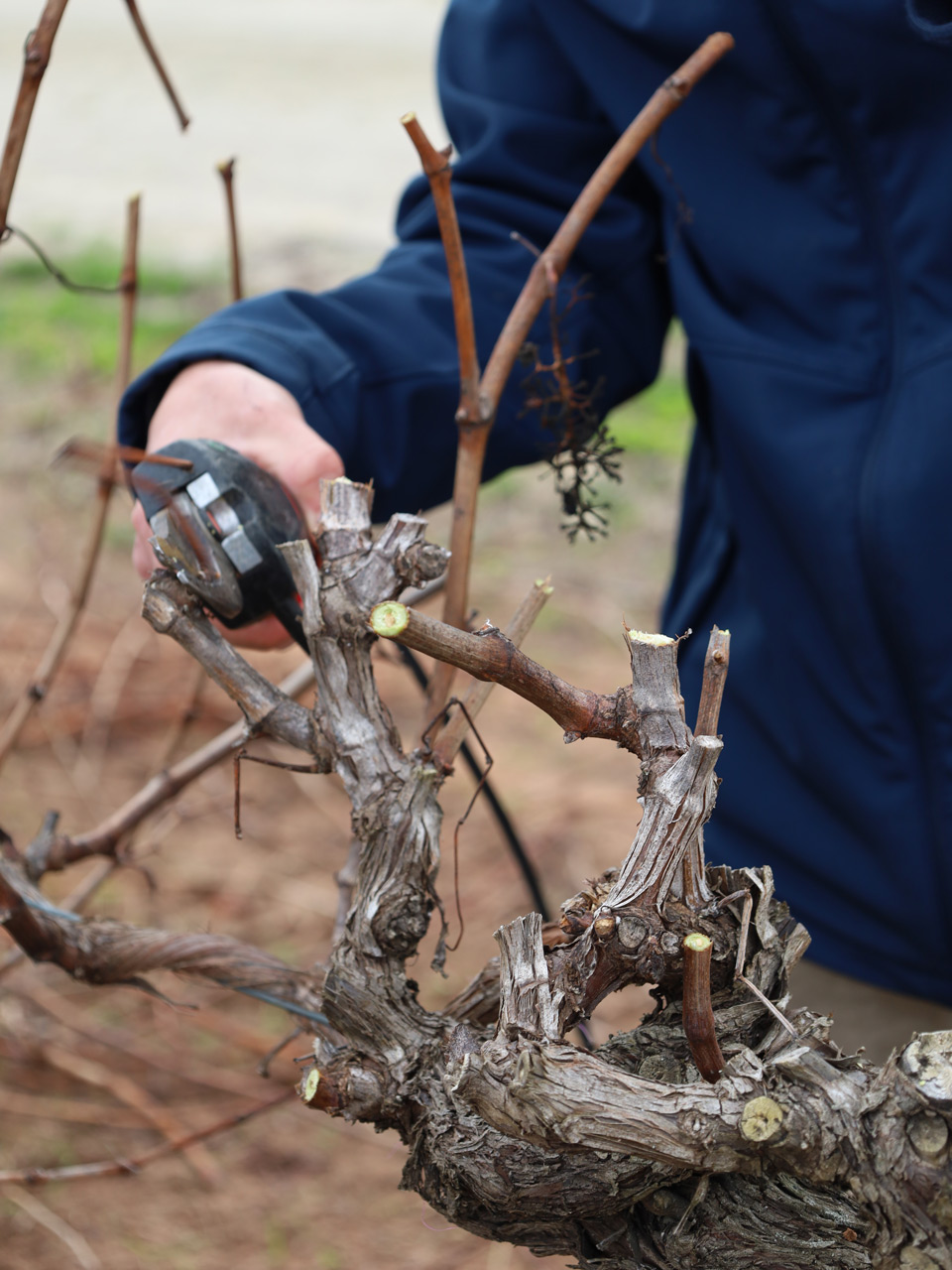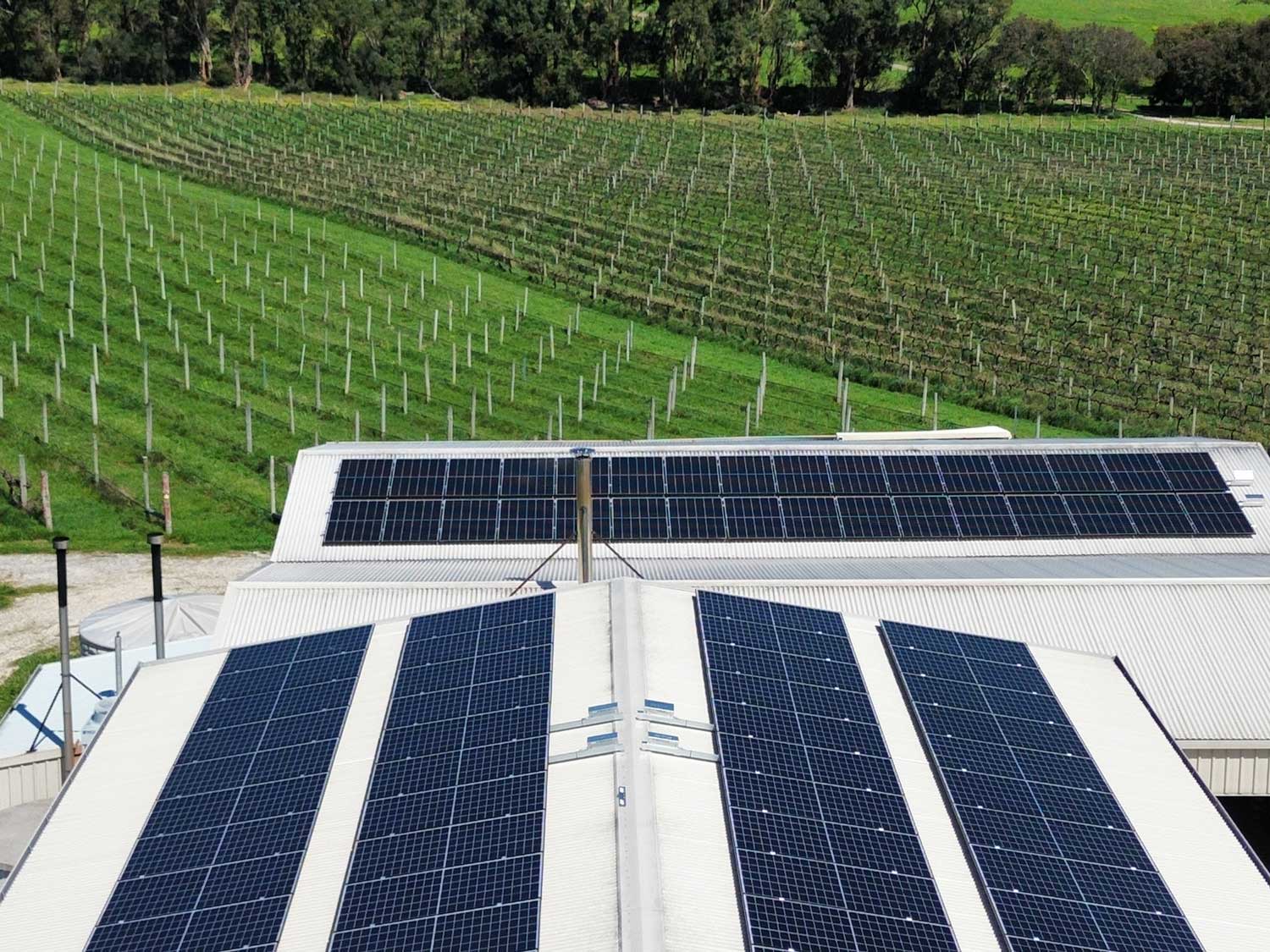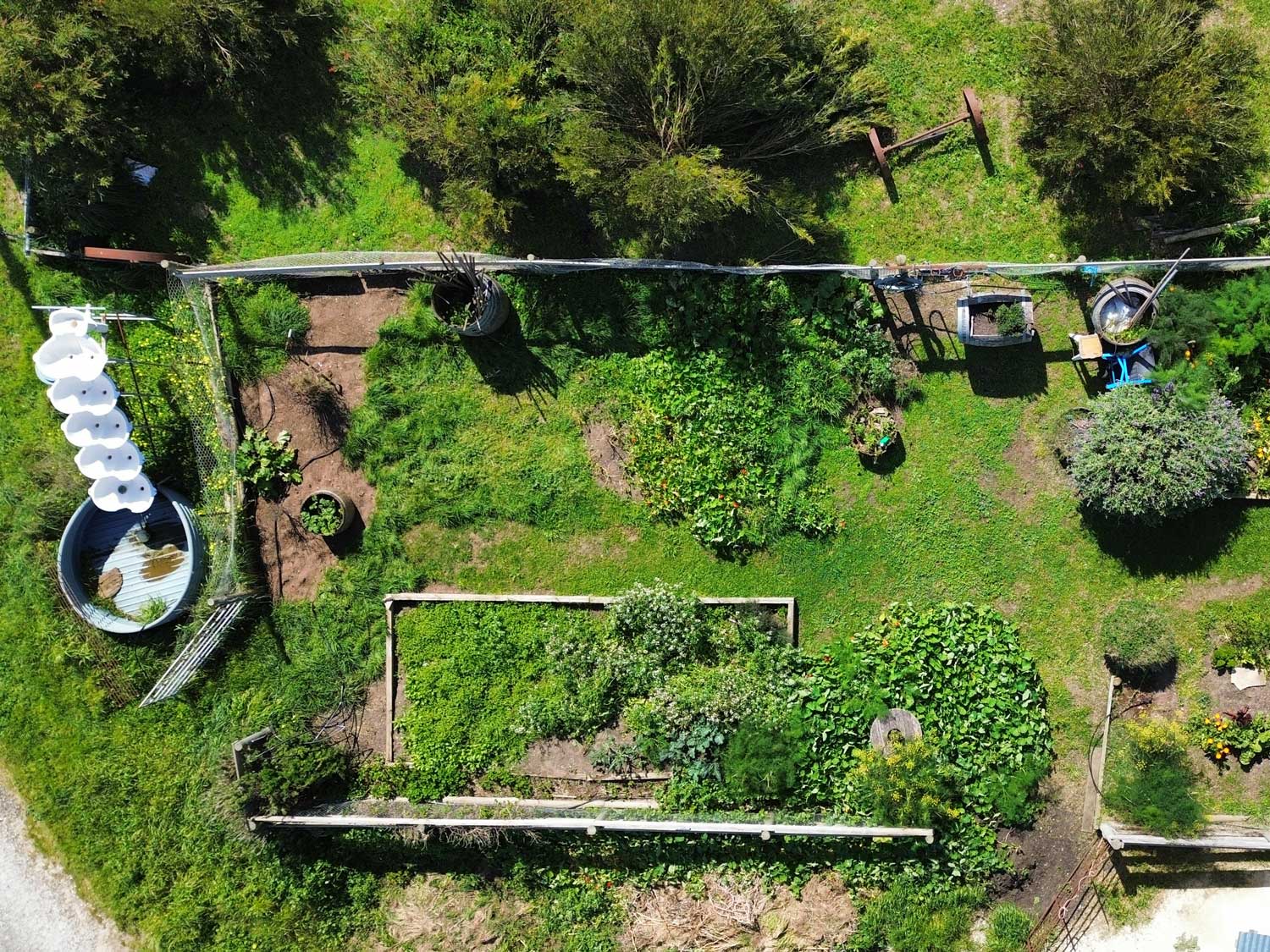Growing on the terra rossa and limestone soils of Mount Benson, with temperatures moderated by the cool salty winds of the Great Southern Ocean, Cape Jaffa Wines has – since its inception in 1993 – been a pioneering beacon for biodynamic practices in the region (officially certified biodynamic since 2005). Led by head grower Hamish Stevenson since 2019, Cape Jaffa Wines continues to innovate and lead in biodynamics for Mount Benson, resulting in ever more characterful grapes and an evolving mix of both classic and experimental wines ‘grown’ from the vineyard. All of this while its commitment to sustainability extends to broader initiatives with a holistic approach to farming.
The vineyard spans 14.1 hectares, planted with a variety of grapes that include pinot gris, chardonnay, sauvignon blanc, shiraz, merlot, cabernet sauvignon, petit verdot, and further red and white varieties in an ‘experimental fruit salad row’. This diversity reflects Cape Jaffa’s experimental spirit and commitment to exploring the full potential of their terroir across its range of wines that includes the ‘La Lune’ series, ‘Aura Project’, and ‘CJW’ blends, among others.
Stevenson points out which varieties particularly express themselves in their corner of South Australia: “I believe one of the most characteristic wines of Mount Benson is shiraz. In our area the wines are fresh, bursting with flavours that remind of blue fruits like blueberries and fresh plums, with a very unique spice, white pepper. The tannins are silky, the colour is intense, and it differs very much from any other shiraz produced in Australia.”
“Shiraz La Lune is one of our best wines. A single vineyard from Block 6, the best block, is produced only in the best vintages. Very characteristic of the area with the typical white pepper aroma you can find in the Mount Benson area,” says Stevenson.
And of the white grape varieties he says, “Sauvignon blanc and pinot gris also truly express the cool climate, and because of the great temperature difference between days and nights, these grapes reveal in the glass fine fruity aromas, minerality and a lively natural acidity. Mount Benson has incredible potential.”
From the beginning, Cape Jaffa adopted a biodynamic approach, seeking harmony between the vineyard and its natural surroundings. This commitment was formalized in 2005 when the vineyard became officially certified biodynamic. Maintaining biodynamic certification in a region such as Mount Benson, where the cool and potentially wet conditions has potential to present risk of certain fungal diseases, is a testament to the commitment here.
Stevenson illustrates: “Despite a very challenging and wet year last vintage in 2023, and the fact we cannot spray any non-approved chemicals, our outside vineyard consultant has informed us that we were one of the least affected vineyards in the area.”
Soil management is a cornerstone of their biodynamic approach, utilizing homemade compost, biodynamic preparations, seaweed-based nutrients, and a permanent grass cover that promotes soil health and biodiversity.
Stevenson points to the results of changes in viticulture techniques: “Giulia – the winemaker – and I were having a couple of beers after work on the winery deck overlooking Shiraz Block 15, and I said to her, ‘Let’s turn this into the best block that Mount Benson has ever seen’, he says. “Since then, I decided to use new different techniques, like Simonit and Sirch pruning, mid row crop with Sulla flowers and Clovers, undervine homemade compost with my ‘secret herbs and spices’ recipe along with the biodynamic preparation we always use in the vineyard. We left aside two rows to compare with the rest of the block. In late February we went for a grape sampling, and we could not believe the incredible difference in terms of flavour, sugar concentration, tannins, YANS and general canopy health. I believe all these improvements have created a unique type of Shiraz, and Giulia has decided to make a single vineyard 100% carbonic maceration Shiraz from it. We love it and drink it always after work!”
Beyond the vineyard, Cape Jaffa extends its sustainable ethos to its operations. “The way I see Cape Jaffa Wines is a place where we can create many different products, not just wine. I cultivated barley for our second business, Loophole Brewing, from which the beer “Back Paddock” is made. We planted Juniper and Native plants for a future project of spirit production. We decided to plant more fruit trees, like lemon trees for future projects like Limoncello making.”
Both the winery and onsite brewery are powered entirely by solar energy. This commitment to renewable energy is part of a broader strategy to minimize the vineyard’s carbon footprint and ensure its operations are as environmentally friendly as possible. The integration of livestock, such as sheep and free-range chickens, into the vineyard ecosystem is another aspect of Cape Jaffa’s holistic approach to sustainability, providing natural weed control and soil fertilization while reducing the need for mechanical intervention.
“We aim to use the tractor as minimally as possible. For example, we use the sheep for grazing the mid row during winter, we leave the chooks free ranging to help in reducing the snail population, and we apply biodynamic preparation through fertigation.”
The sustainable thinking extends to the production of their compost. “Instead of Nitrogen and Carbon commercial fertiliser, I specifically created a compost with the required amount of carbon (coming from Biochar made with pruning waste), Nitrogen (seaweed from Cape Jaffa beach) and other key elements like potassium from the grape marks. In this way we nurture the soil in a natural way, avoiding the leaching of concentrated fertilisers, which go straight to the water table ending up in the ocean.”
As for the winery: “Our winery is fully powered by solar power coming from the solar panels on the top of the roof, and we offer a free power station for electric car recharging. We also try to minimise our wastage. For example, all the glass bottles used in cellar door are crushed and made into fiberglass from a local entrepreneur.”
Cape Jaffa Wines is more than just a vineyard; it is a living laboratory for sustainable viticulture and a beacon of biodynamic farming in the Limestone Coast. The vineyard’s innovative approaches to viticulture, commitment to biodynamic principles, and dedication to environmental stewardship have not only contributed to the production of exceptional wines but have also set a precedent for sustainable farming practices in the region.
As Cape Jaffa looks to the future, it remains committed to pushing the boundaries of sustainable viticulture and exploring new ways to enhance the health of its land and the quality of its wines. Through continued experimentation, a deep respect for the environment, and a passionate team led by Hamish Stevenson, Cape Jaffa Wines is poised to continue its legacy as a pioneer of sustainable winemaking in Australia.
“We had experienced a few wet seasons in a row, and for me the last few seasons have been another confirmation of how resilient our vines are after 30 years of biodynamic approach. We work with an external consultant, who works with multiple companies within the Limestone Coast, who has reported to us that our vineyard was one of the least affected in the whole area during vintage 2023. For me this means, ‘Be one with Nature and Nature will be one with you’.”






